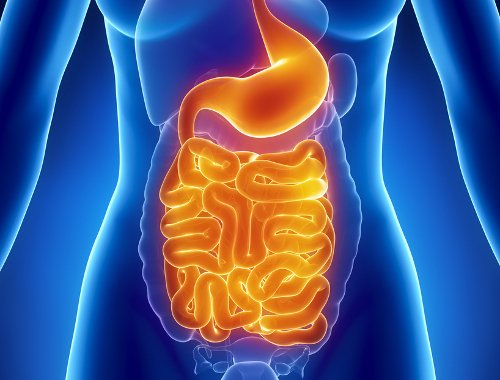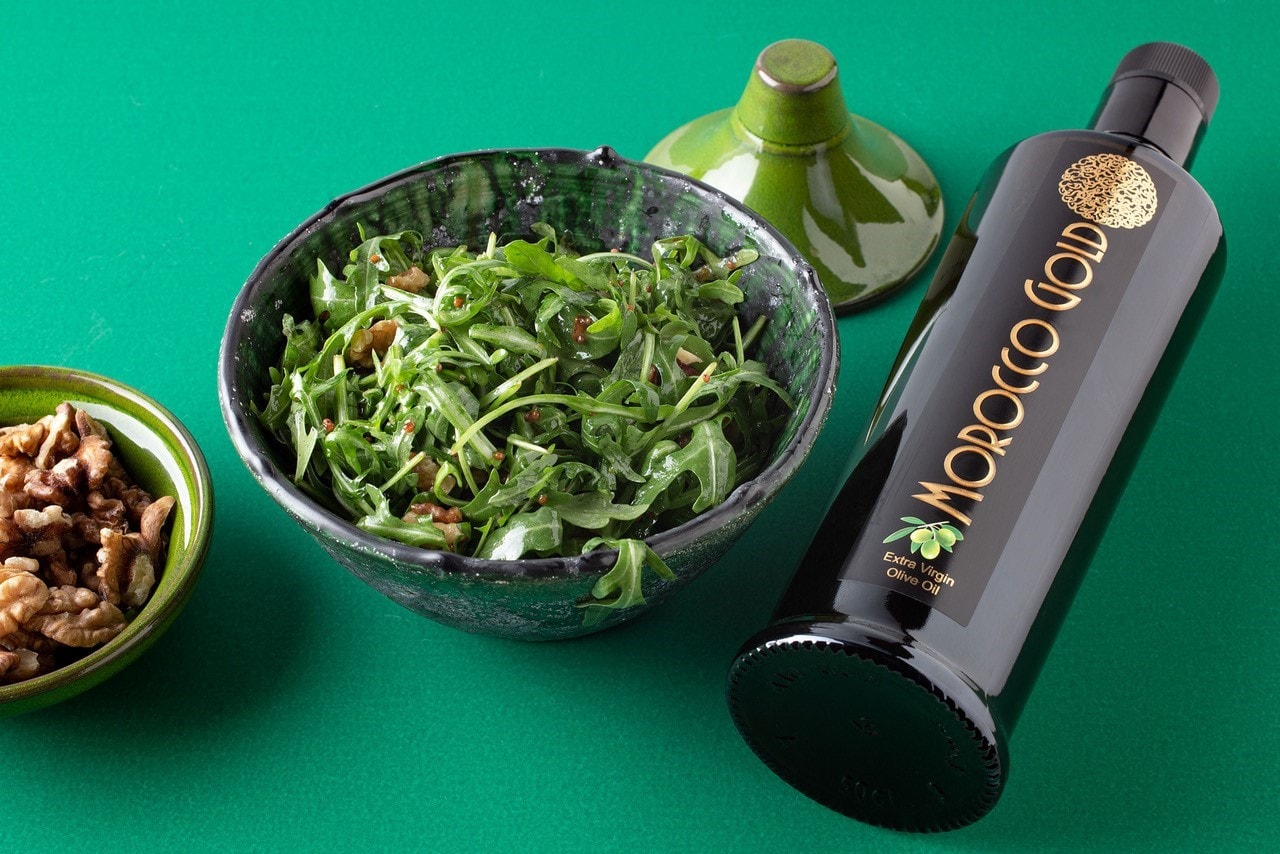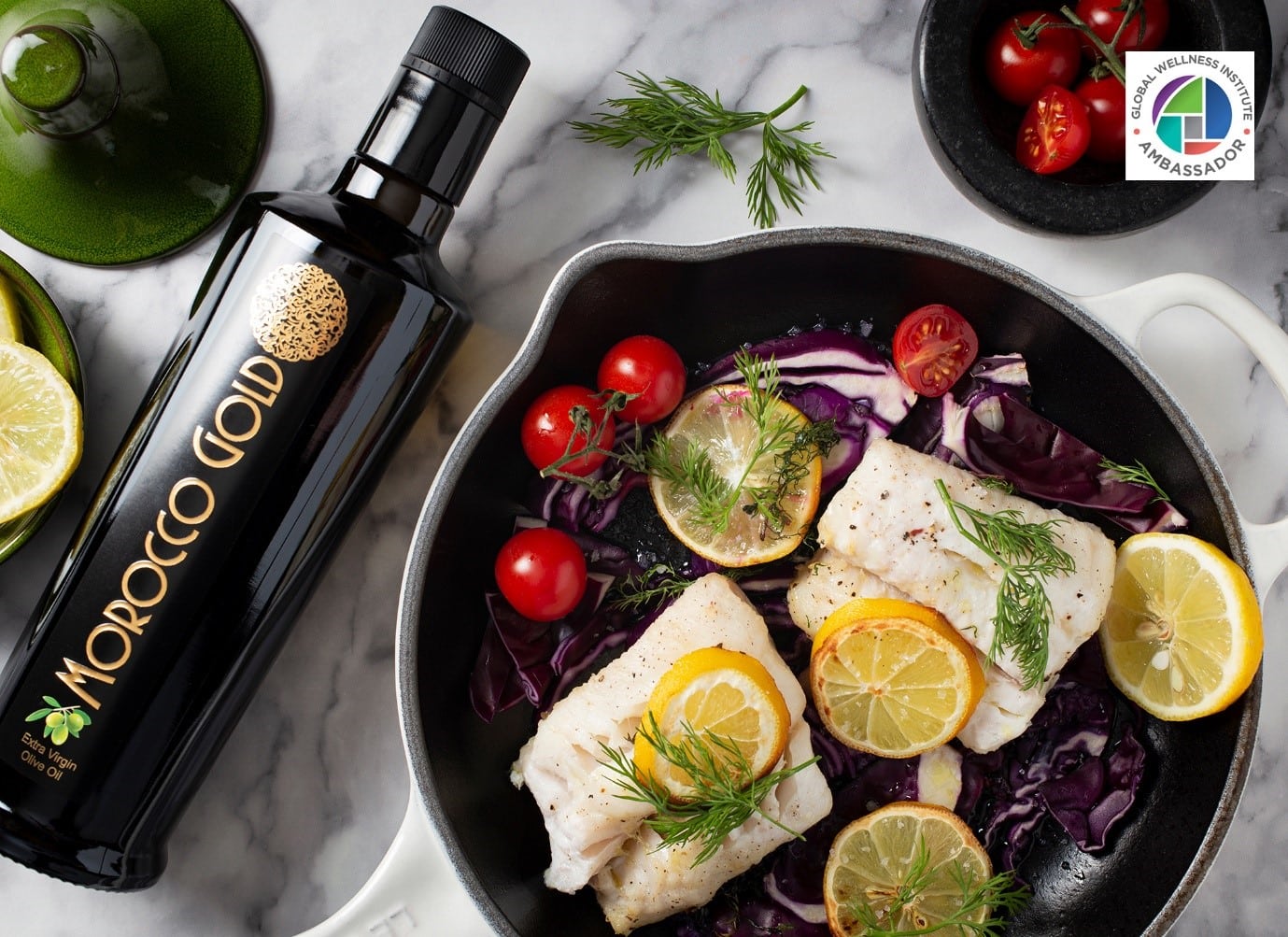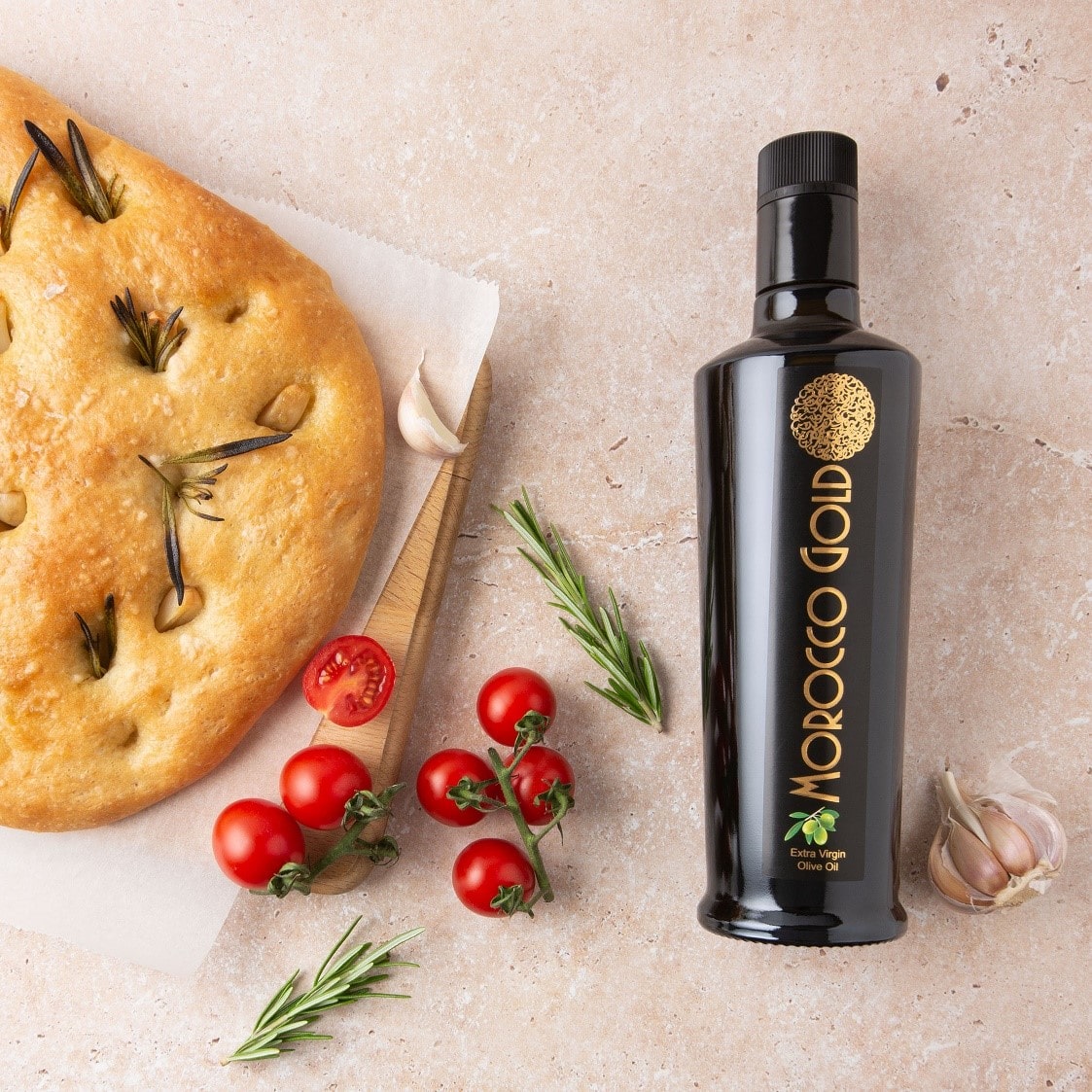One Of The Many Amazing Health Benefits Of Extra Virgin Olive Oil
Updated July 21st 2025
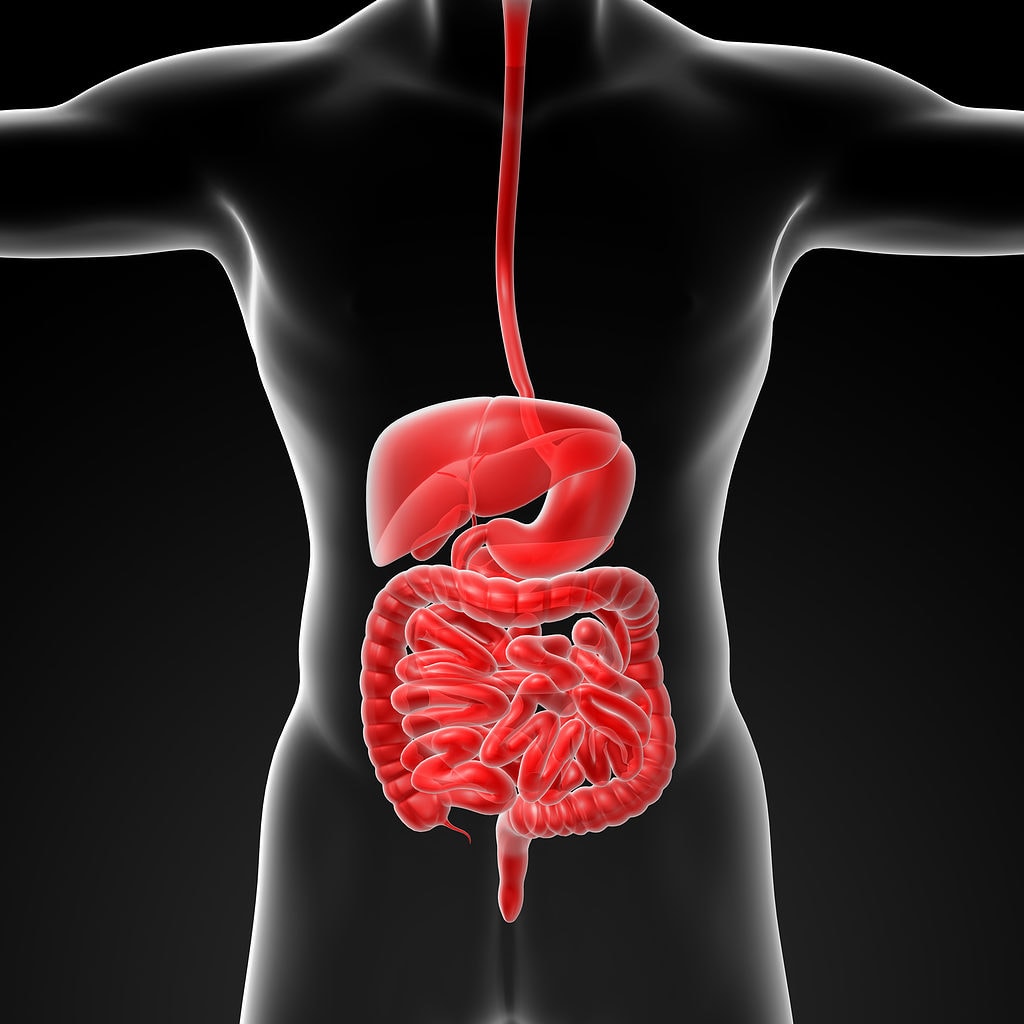
Summary
- Digestive disorders are widespread and can be brought on with little or no warning.
- The cost of digestive disorders in the USA can range from $18k to $150k per year.
- Extra virgin olive oil has been used to treat digestive disorders for centuries. Its beneficial properties are now being confirmed by epidemiological studies and a wealth of scientific data.
- Extra virgin olive oil has beneficial effects on the stomach, the hepatic-biliary system, the pancreas, and the intestines.
- The polyphenols in Morocco Gold extra virgin olive oil provide the health benefits within the digestive system, in particular – Hydroxytyrosol and Tyrosol.
- People with digestive diseases often suffer in silence because of the stigma associated with digestive symptoms. Many won’t even discuss gut trouble with their doctors. When they finally do, it’s because the pain, blood, fatigue or constant bowel disruptions have become unbearable. Severe symptoms result in missed workdays, ER visits, emergency surgeries, and finally long-term prescriptions.
Contents
- Is Olive Oil Good for Your Stomach?
- Rising Cost of Digestive Diseases
- Understanding Digestive Disorders
- How Does Extra Virgin Olive Oil Help Digestion
- Extra virgin olive oil & the stomach
- Extra virgin olive oil & the hepatic-biliary system
- The Anti-Inflammatory Properties of Olive Oil
- Extra Virgin Olive Oil & The Pancreas
- Extra Virgin Olive Oil and Heart Health
- Extra Virgin Olive Oil & The Intestines
- How Extra Virgin Olive Oil Can Boost Beneficial Gut Bacteria
- Drinking Olive Oil for Gut Health
- The Polyphenols Present In Morocco Gold Extra Virgin Olive Oil
- The Effects of Olive Oil on Disease Prevention
- Which Polyphenols Protect The Digestive System?
- Health Benefits Of Hydroxytyrosol In Extra Virgin Olive Oil
- Polyphenol Tyrosol: A Key Polyphenol In Morocco Gold Extra Virgin Olive Oil
Is Olive Oil Good for Your Stomach, Digestion and Bloating?
Olive oil, especially extra virgin, supports the digestive system in several ways. It promotes healthy gut function, eases symptoms like bloating, and supports smoother bowel movements. Thanks to its high content of olive oil phenolic compounds and monounsaturated fatty acids, it helps regulate gastric acid, reducing discomfort from indigestion or reflux.
Drinking refined olive oil in small amounts, particularly on an empty stomach, may support more regular bowel movements and relieve constipation. This makes it a simple, natural addition to your diet to support gut health.
Rising Cost of Digestive Diseases
1 in 3 Americans struggle with Crohn’s disease, ulcerative colitis, irritable bowel syndrome (IBS), celiac disease, and other digestive conditions daily. Healthcare spending on a single patient with a digestive disease can range from $18k to $150k per year. Speciality medications can cost up to $70k per person per year.
When we look at the high cost of speciality drugs used to treat advanced digestive disorders, it’s easy to see how stigma and suffering in silence can eventually lead to a very expensive problem, for both individuals and health services.
Understanding Digestive Disorders
Digestive conditions can be brought on by stress, diet, and medications with little or no warning. Episodic flares lead to ER admissions and hospitalisations with very costly treatments. For people with digestive disease, following medication regimens can be very challenging, especially if they have other medical conditions to deal with. This can often result in poor outcomes, which, you guessed it, means even greater healthcare costs.
The digestive system provides fuel for the entire human body. It essentially supports all of the body’s other systems. When the digestive system is out of balance with an abnormal ratio of good to bad microbes, some really unpleasant digestive conditions can creep up, causing chronic inflammation and a host of unpleasant symptoms. Diarrhoea, constipation, and pain are only part of it. Extreme fatigue, nausea, eye and mouth sores, skin conditions like eczema and psoriasis, and mental health disorders like depression and anxiety are all closely linked to digestive health.
Add to that poor diets, allergies and busy lifestyles, and gut trouble is becoming a very big and very expensive problem.

How Does Extra Virgin Olive Oil Help Digestion
We all have likely heard that extra virgin olive oil is one of the healthiest oil choices for cooking and eating with its many health benefits. Extra virgin olive oil is high in fat, but the majority of it is heart-healthy monounsaturated fat, according to the American Heart Association. Choosing extra virgin olive oil over less healthy fats, such as butter, may benefit your heart and lower your cholesterol level. If these benefits are not enough, extra virgin olive oil may also contribute to a healthy digestive system.
As soon as we consume extra virgin olive oil like Morocco Gold it has a number of effects all the way along the digestive system. As far back as in ancient times it was recommended for assorted digestive disorders, and its beneficial properties are now being corroborated by epidemiological studies and a wealth of scientific data.
Once you swallow your food, your body takes over by secreting acids and other compounds that help break down the food and transport the nutrients it contains throughout your body. According to M. Carmen Ramirez-Tortosa and Parveen Yaqoob, authors of “Olive Oil and Health,” extra virgin olive oil encourages the production of peptides, which support healthy digestion and aid in nutrient absorption. Regular consumption of olive oil will keep your gut working efficiently by taking what it needs for good health and eliminating the rest in your waste.
Extra virgin olive oil & the stomach
Eating quickly, as well as eating high-fat foods, can cause gastric reflux, or heartburn. Heartburn is characterised by a burning sensation in your stomach, throat or oesophagus due to a high concentration of acid from your body attempting to digest unhealthy types of food. A study published in the 2004 issue of “Gracas y Aceites,” a journal that focuses on the roles of fat and oils in the human diet, notes that extra virgin olive oil may reduce the secretion of gastric acid.
Extra virgin olive oil reduces the risk of acid reflux and prevents gastric juices from travelling back up from the stomach to the oesophagus. Extra virgin olive oil inhibits gastric acid’s motility. Because of this, the stomach’s gastric content releases more gradually and slowly into the duodenum, making one feel fuller, having better digestion, and benefiting from full nutrient absorption in the intestine.
Extra virgin olive oil & the hepatic-biliary system
One of the effects of extra virgin olive oil on the hepato-biliary system or a healthy digestive system is that it is a cholagogue, ensuring optimal bile drainage and full emptying of the gall bladder. Another effect is that it is cholecystokinetic, i.e. it stimulates the contraction of the gall bladder, which is extremely helpful in the treatment and prevention of disorders of the bile ducts. It stimulates the synthesis of bile salts in the liver, and it increases the amount of cholesterol excreted by the liver.
In short, owing to its beneficial effect on the muscle tone and activity of the gall bladder, extra virgin olive oil stimulates the digestion of lipids, because the bile emulsifies them, and it prevents the onset of gallstones. This points to a healthy digestive system.
The Anti-Inflammatory Properties of Olive Oil
Chronic inflammation can negatively affect your digestive system, leading to conditions like inflammatory bowel disease or irritable bowel syndrome. The polyphenols in extra virgin olive oil, including hydroxytyrosol and oleuropein, have been shown to reduce inflammatory responses in the gut. By helping to regulate immune activity and oxidative stress, olive oil may support better digestion, lower the risk of gastrointestinal issues, and help prevent flare-ups of chronic diseases linked to inflammation.
Extra Virgin Olive Oil & The Pancreas
Your pancreas is often an overlooked part of the digestive system, but it is essential for hormone production and for producing enzymes that the small intestine needs to digest your food. Extra virgin olive oil is particularly beneficial to your pancreas because it only requires your pancreas to produce a small amount of digestive enzymes, which means that it is working less, according to the aforementioned study in “Gracas y Aceites.” This benefits your pancreas by keeping it strong and healthy. The June 2000 issue of the “Journal of Epidemiology and Community Health” adds that extra virgin olive oil may also offer protection from pancreatic cancer.
When extra virgin olive oil is consumed, the pancreas releases a small amount of secretion, helping the organ efficiently and effectively carry out its purpose within the digestive system. Researchers recommend extra virgin olive oil to patients who have pancreatic problems, including cystic fibrosis, chronic pancreatitis, pancreatic failure, and malabsorption syndromes.
Extra Virgin Olive Oil and Heart Health
There is a strong connection between digestive health and cardiovascular well-being. Diets high in monounsaturated fats, such as those found in extra virgin olive oil, are linked to reduced cardiovascular risk and better metabolic health.
Studies show that regular olive oil intake helps lower cholesterol levels, supports healthy blood pressure, and may reduce the risk of heart disease. These benefits, alongside improved gut function, make olive oil a key component of a balanced, heart-healthy diet.
Extra Virgin Olive Oil & The Intestines
Your large and small intestines are essential for digesting your food and getting the nutrients throughout your body. Eating extra virgin olive oil in place of less healthy oils can improve the efficiency of your intestines. Olive oil also encourages your intestines to absorb more of the vitamins and minerals from the foods you eat, which makes it beneficial for individuals suffering from digestive disorders, according to a 2004 study in “Gracas y Aceites.”
New research is also showing that polyphenols in extra virgin olive oil may help balance the bacteria in our digestive tract, slowing the growth of unwanted bacteria. On this list of polyphenols are: oleuropein, hydroxytyrosol, tyrosol and ligstroside. Some of these polyphenols are specifically able to inhibit the growth of the Helicobacter pylori bacterium; the bacterium that leads to stomach ulcers and other unwanted digestive problems. Yet another category of polyphenols, called secoiridoids, continues to be a focus in research on the prevention of digestive tract cancers.
How Extra Virgin Olive Oil Can Boost Beneficial Gut Bacteria
Taking care of our healthy gut bacteria is one of the best ways to keep our digestive system working well and protect our immune system. That means packing as many fresh fruit and vegetables, whole grains and Mediterranean staples like extra virgin olive oil into our cooking as we can.
Recent studies have shown that people who ate diets rich in plant-based foods and fish, such as the famous Mediterranean diet, had higher collections of inflammation-fighting bacteria in their guts.
But perhaps you need some new inspiration to bring those beneficial bacteria-busting plant-based foods to life? Well, we at Morocco Gold are very happy to oblige with a selection of our favourite microbiome-friendly recipes to boost your gut health.
And, don’t forget, our new harvest of extra virgin olive oil is now available to purchase, meaning you can treat your meals to the freshest flavour direct from our olive groves in the foothills of Morocco’s Atlas Mountains.
Drinking Olive Oil for Gut Health
Drinking a spoonful of olive oil each morning is a tradition in many Mediterranean cultures. This practice can support your digestive system by lubricating the gut lining, encouraging healthy enzyme production, and delivering antioxidant-rich compounds directly to your system.
While it’s not a cure, this daily routine may help maintain a healthy gut microbiome, support immune system resilience, and improve digestion. Be sure to choose high-quality, unrefined extra virgin olive oil like Morocco Gold to maximise the benefits.
The Polyphenols Present In Morocco Gold Extra Virgin Olive Oil
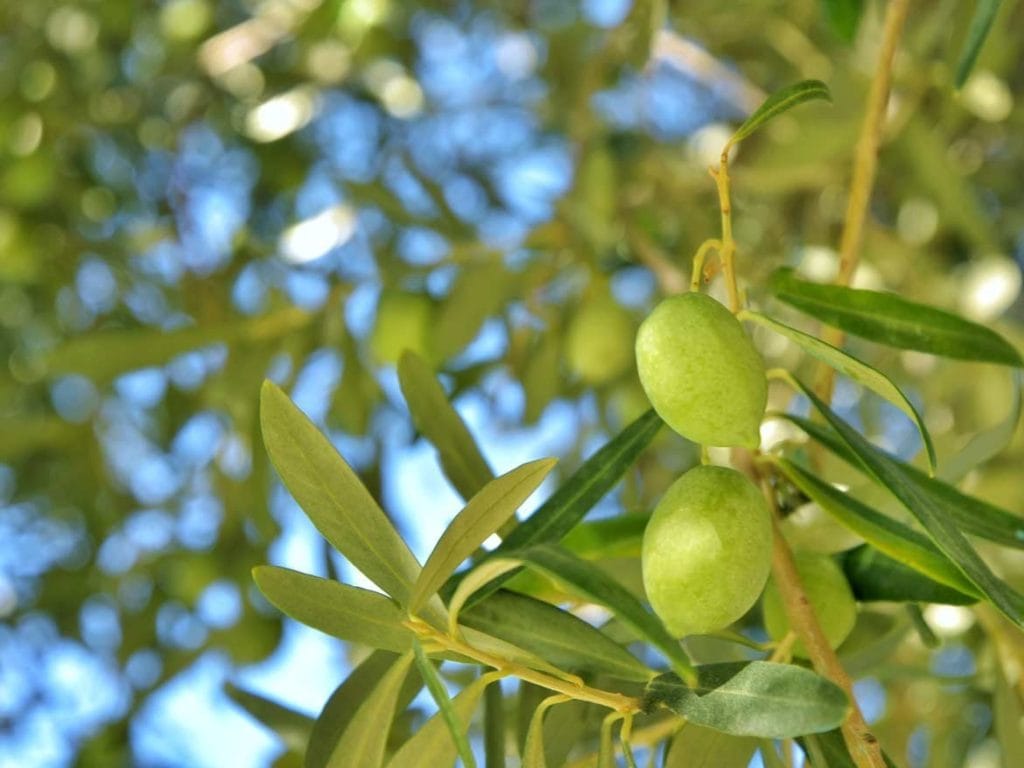
More than 30 phenolic compounds have been identified in extra virgin olive oil, but not all of them are present in every oil. The large variety of polyphenols found in extra virgin olive oil is different in chemical structures and concentrations depending on several factors, including: olive variety, region in which the olive is grown, agricultural techniques, maturity of the olive fruit at harvest, and processing. Indeed, different varieties, cultivated in the same environment and processed at a fixed ripening stage, produce extra virgin olive oil with different total polyphenol profiles.
We are delighted to say that this year’s harvest has produced a low acidity level of 0.2% together with the highest level of polyphenols yet seen in our extra virgin olive oil.
| 3,4 DHPEA-EDA | 83 mg/kg |
| Hydroxytyrosol | 5 mg/kg |
| Lignanes | 25 mg/kg |
| Ligstroside aglycone (p, HPEA-EA) | 19 mg/kg |
| Oleuropein aglycone (3,4 DHPEA-EA) | 69 mg/kg |
| Oleocanthal p, HPEA-EDA | 63 mg/kg |
| Tyrosol | 362 mg/kg |
| Polyphenols Total | 626 mg/kg |
The Effects of Olive Oil on Disease Prevention
Scientific research suggests that olive oil may help reduce the risk of chronic diseases, including cardiovascular diseases, certain cancers, and neurological conditions. These potential health benefits stem from olive oil’s high antioxidant content, ability to reduce reactive oxygen species, and influence on cholesterol levels.
In randomised controlled trials, extra virgin olive oil consumption has been linked with reduced cardiovascular risk, improved central nervous system function, and weight management support. These broader health effects also contribute to a healthier digestive system and overall wellness.
Which Polyphenols Protect The Digestive System?
Polyphenol Hydroxytyrosol
Hydroxytyrosol is a powerful polyphenol that occurs naturally in olive fruit, pulp, leaves, and mill wastewater. Chemically, hydroxytyrosol is described as 4-(2-hydroxyethyl)-1,2-benzendiol, with the chemical formula C8H10O3.2
Hydroxytyrosol is a well-known minor component found in extra virgin olive oil, which is derived from hydrolysis of the polyphenol oleuropein during olive maturation and olive oil storage. The compound plays an important role in the complex and varied flavour of olives and olive oil.
It is also a vital component which largely adds to the stability and longevity of extra virgin olive oil.
Hydroxytyrosol is hydrophilic and absorbed in a dose-dependent manner in humans, with absorption occurring in the small intestine and colon. Uniquely, hydroxytyrosol is the only polyphenol that can cross the blood-brain barrier, which allows it to have a significant effect on scavenging free radicals in the nervous system.
Health Benefits Of Hydroxytyrosol In Extra Virgin Olive Oil
Antimicrobial Activity
In vitro experiments have shown that hydroxytyrosol in extra virgin olive oil has antimicrobial properties against infectious respiratory and gastrointestinal pathogens.It is also known that hydroxytyrosol in extra virgin olive oil has activity against gram positive and gram-negative bacteria. In general, polyphenols have been reported to have wide antimicrobial activity, such as antibacterial, antiviral and antifungal effects.
Polyphenol Tyrosol : A Key Polyphenol In Morocco Gold Extra Virgin Olive Oil
Tyrosol is a phenylethanoid, a derivative of phenethyl alcohol. It is a natural phenolic antioxidant present in a variety of natural sources. The principal source for the human diet is high-quality extra virgin olive oil, like Morocco Gold. As an antioxidant, tyrosol can protect cells against injury due to oxidation.
Along with hydroxytyrosol, tyrosol is one of the most abundant polyphenols in extra virgin olive oil, where it occurs as such or in the form of esters of oleanolic acid. An increasing amount of research is being conducted into these polyphenols and their properties to determine which is the most significant contributor to the range of health benefits associated with high-quality extra virgin olive oil.
Tyrosol is a colourless solid at room temperature, melting at 91–92°C and slightly soluble in water. Hydroxytyrosol, on the other hand, appears as a clear, colourless liquid at room temperature. It is now believed that this affects the rate of ‘uptake’ when ingested, with hydroxytyrosol acting more quickly in the gut. However, tyrosol accumulates intercellularly over time to provide longer-term protection due to its higher concentration and good bioavailability.

